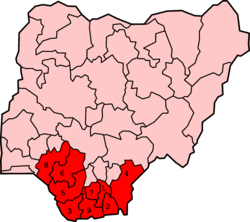Conflict in the Niger Delta
| Conflict in the Niger Delta | |||||||
|---|---|---|---|---|---|---|---|
 Map of Nigeria numerically showing states typically considered part of the Niger Delta region: 1. Abia, 2. Akwa Ibom, 3. Bayelsa, 4. Cross River, 5. Delta, 6. Edo, 7.Imo, 8. Ondo, 9. Rivers |
|||||||
|
|||||||
| Belligerents | |||||||
|
Niger Delta Avengers (2016-present) Reformed Egbesu Fraternities
Movement for the Emancipation of the Niger Delta (2004-2014) Niger Delta Vigilante (2004-2009) |
|||||||
| Commanders and leaders | |||||||
|
|
Henry Okah (POW) Ateke Tom |
||||||
| Strength | |||||||
| 150,000 soldiers | unknown | ||||||
| Casualties and losses | |||||||
| ~15,000 militants surrendered as of 2016 | |||||||
Niger Delta Avengers (2016-present)
Niger Delta Greenland Justice Mandate (2016-present)
Joint Niger Delta Liberation Force (2016-present)
Niger Delta Red Squad (2016-present)
Adaka Boro Avengers (2016-present)
Asawana Deadly Force of Niger Delta (2016-present)
Niger Delta Revolutionary Crusaders (2016-present)
Reformed Egbesu Fraternities
Movement for the Emancipation of the Niger Delta (2004-2014)
Niger Delta People's Volunteer Force (2003-2009)
Niger Delta Liberation Front (2005-2014)
Joint Revolutionary Council (2004-2014)
Henry Okah (POW)
Government Ekpemupolo
Ebikabowei Victor-Ben
Dokubo-Asari
John Togo †
The current conflict in the Niger Delta first arose in the early 1990s over tensions between foreign oil corporations and a number of the Niger Delta's minority ethnic groups who feel they are being exploited, particularly the Ogoni and the Ijaw. Ethnic and political unrest has continued throughout the 1990s despite the conversion to democracy and the election of the Obasanjo government in 1999. Competition for oil wealth has fueled violence between ethnic groups, causing the militarization of nearly the entire region by ethnic militia groups, Nigerian military and police forces, notably the Nigerian Mobile Police.
...
Wikipedia
